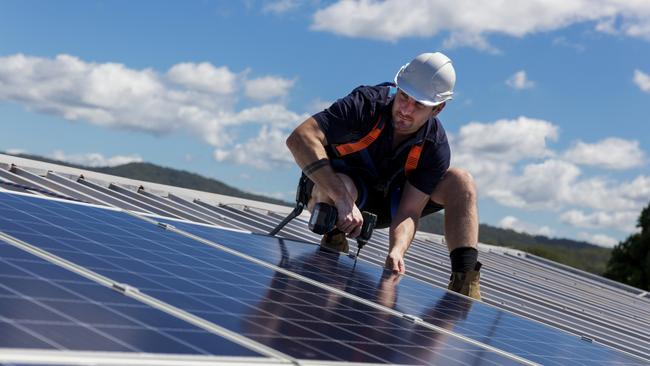Rooftop solar the power bill winner: ACCC
Overall household power bills are expected to ease this year as suppliers pass on lower wholesale prices to customers.

People with rooftop solar systems saved nearly a third on their electricity costs last year compared to those without rooftop systems, with the competition regulator hopeful a jump in power bills will be reversed this year as suppliers pass through lower wholesale prices to customers.
Residential solar customers paid $94 less on average for their quarterly bill, marking a 29 per cent saving compared with those without rooftop systems installed, according to the Australian Competition & Commission’s latest electricity markets report.
While household prices dropped by 4.8 per cent on average last year, power bills increased 7 per cent due to a 10 per cent surge in usage as more people worked from home due to Covid-19. The same pandemic trend meant small businesses achieved savings of 16 per cent on their power bills as staff deserted the office.
While households with rooftop solar increased their energy use in line with the rest of the population, their bills remained lower over the period.
Customers with solar used 9 per cent more power but paid 2 per cent less on a quarterly basis compared to the prior year, with an average bill of $253. Non-solar customers used 11 per cent more power compared with 2019 and their bill jumped by 8 per cent to $347 a quarter.
Big falls in wholesale electricity costs – the prices that retailers pay day to day for uncontracted electricity – is likely to result in lower electricity bills this year, the ACCC predicts.
“We expect 2021 to be a better year for households and small businesses as large reductions in the wholesale cost of electricity continue to flow through to people’s bills,” ACCC chairman Rod Sims said.

Wholesale spot prices fell 50 per cent between mid-2019 and early this year, but coal outages, cold weather and strong demand combined to spark a big jump in May and June that may partly offset those savings. Prices in the three months to June 30 are expected to be some of the highest on record for NSW and Queensland, according to the University of Melbourne’s Dylan McConnell.
The Morrison government’s “big stick” energy law came into effect in June last year in a crackdown on energy companies gouging electricity bills. The ACCC said it would ensure utilities were making changes to their prices in line with their costs to secure electricity.
Some 2.8 million people now have rooftop solar, but the competition regulator is concerned that their rebates are in effect being subsidised by consumers without the technology.
“Customers on hardship or payment plans have the lowest rates of solar, so you have to question how fair it is for these people to be subsidising the costs of solar customers,” Mr Sims said.
Solar customers on premium feed-in tariffs, legacy rates set at high levels, had median annual rebates of $858 for residential and $1993 for small business.
The ACCC has previously said rooftop solar subsidies should be axed and the states should take on the cost of “excessively generous” solar feed-in tariffs to ease the burden of green power schemes.
“The ACCC has previously called for state governments to end premium feed-in tariff schemes because these subsidy incentives are no longer required and the cost of these schemes is paid for by non-solar customers,” the ACCC said.
“These schemes are closed to new entrants, though the NSW government is the only government to have entirely closed the scheme.”
The ACCC report shows that 7 per cent of residential customers were still on more expensive standing offers last year, with the regulator estimating a typical household could save $200 a year by switching to a median market offer instead.




To join the conversation, please log in. Don't have an account? Register
Join the conversation, you are commenting as Logout